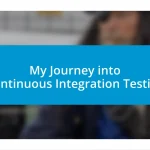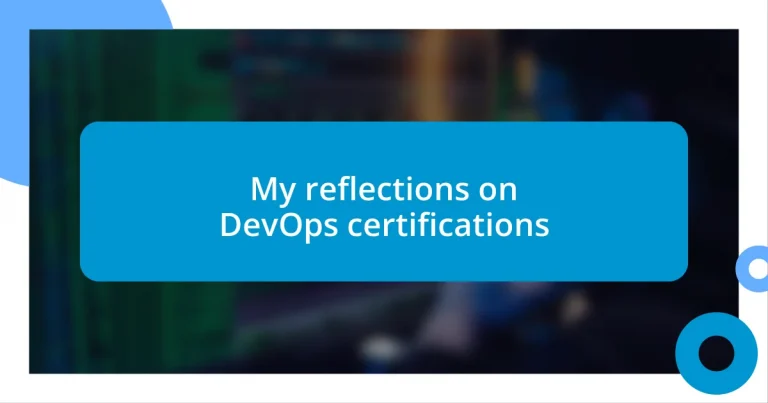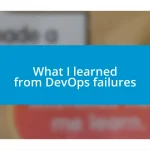Key takeaways:
- DevOps certifications enhance skills, open career opportunities, and build confidence, making them valuable for professional growth.
- Choosing the right certification aligns with personal career goals, with options ranging from foundational to specialized focuses, such as cloud services and container orchestration.
- Future trends in DevOps certifications are leaning towards specialization in areas like security and microservices, emphasizing the importance of continuous learning and adaptation in the field.
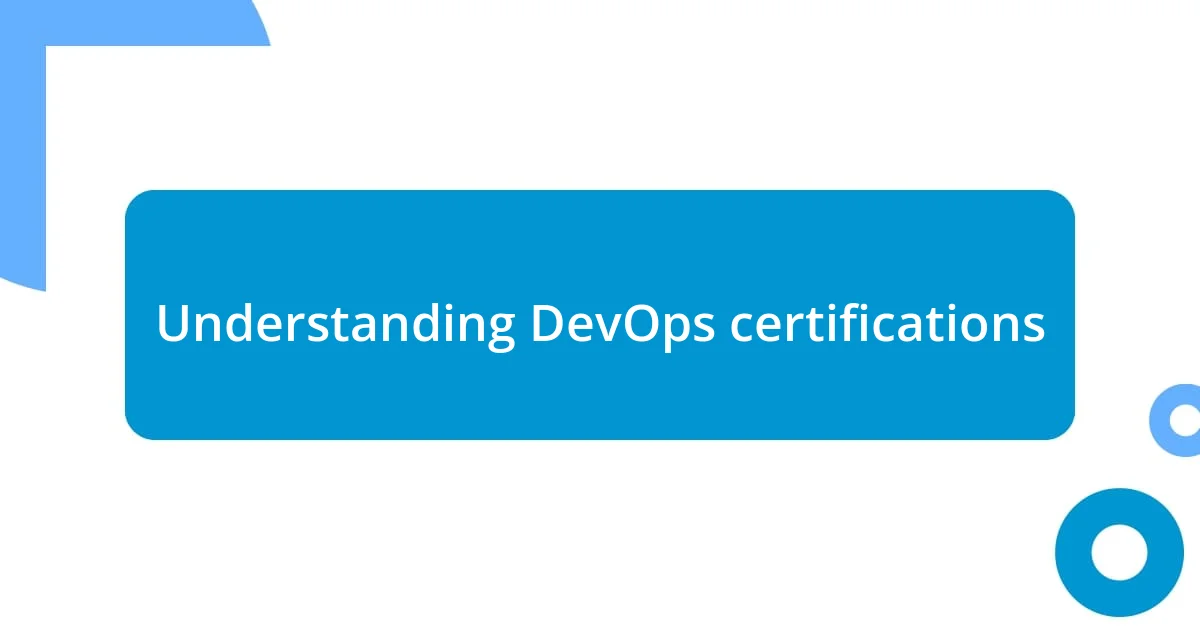
Understanding DevOps certifications
DevOps certifications serve as benchmarks in a field where knowledge and practical skills overlap. When I was first considering a certification, I felt a mix of excitement and apprehension. I wondered, “Will this truly enhance my skills, or is it just a piece of paper?” This emotional tug-of-war reflected the common uncertainty many feel when choosing to pursue these qualifications.
The variety of certifications available can be overwhelming. Each one offers a different focus, from practices and tools to cultural philosophies. I remember when I pursued my certification; I found myself gravitating toward one that emphasized cloud technologies because I was eager to deepen my understanding in an area that felt both crucial and fascinating.
It’s crucial to realize that obtaining a certification is not just about passing an exam. It’s an opportunity to cement your knowledge and showcase your commitment to professional growth. I can recall the satisfaction I felt after earning mine—it wasn’t solely the certification itself, but also the confidence it instilled in me to tackle real-world challenges with a fresh perspective.
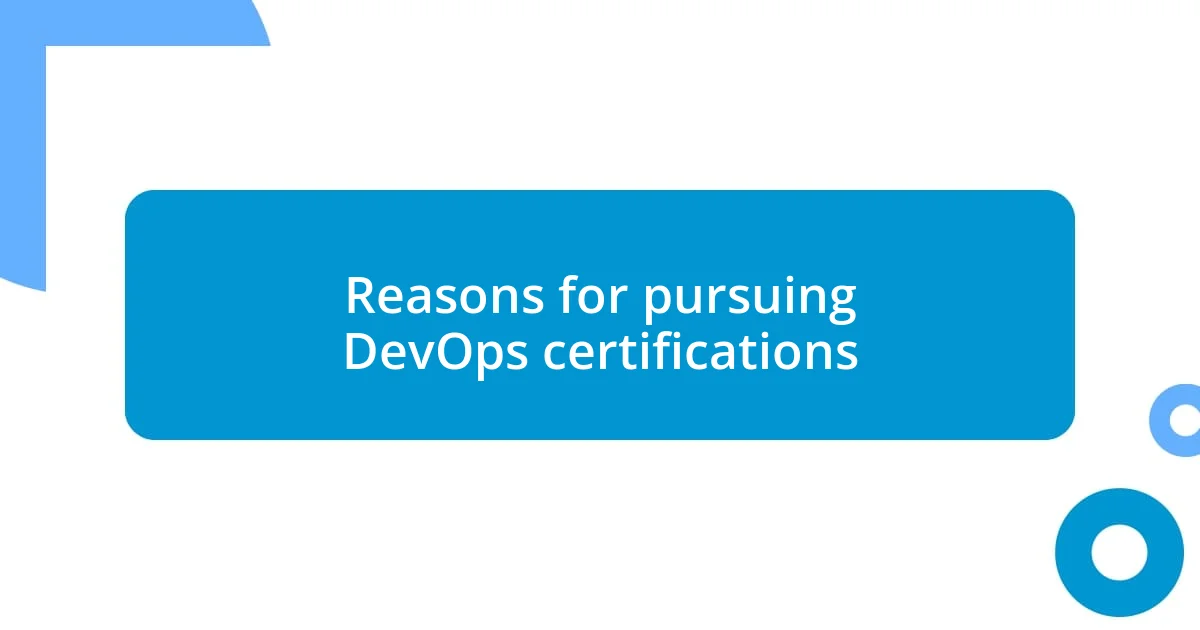
Reasons for pursuing DevOps certifications
Pursuing DevOps certifications can genuinely transform your professional journey. For me, it wasn’t just about adding a line to my resume; it was about unlocking new opportunities and broadening my understanding of critical concepts. Every learning moment reinforced my skills and prepared me for practical challenges, filling me with an exhilarating mix of confidence and capability.
Here are some compelling reasons to pursue DevOps certifications:
- Career Advancement: Having a certification can lead to promotions and open doors to higher-level positions.
- Skill Validation: Certifications demonstrate your expertise to employers, assuring them that you possess the necessary skills.
- Networking Opportunities: Joining certification programs often connects you with a community of like-minded professionals, expanding your network.
- Stay Updated: The DevOps field is always evolving. Certifying helps you stay current with the latest tools and trends.
- Personal Growth: Overcoming the challenges of studying for a certification can boost your confidence, helping you tackle new projects with assurance.
Reflecting on my certification journey, I remember the late nights spent studying and the sense of accomplishment that followed. It felt great to articulate complex DevOps concepts clearly, both to my peers and in interviews. Each challenge I faced during my preparation sharpened my problem-solving skills, making me agile in real-world situations. This journey not only enhanced my knowledge but also deepened my passion for the field.
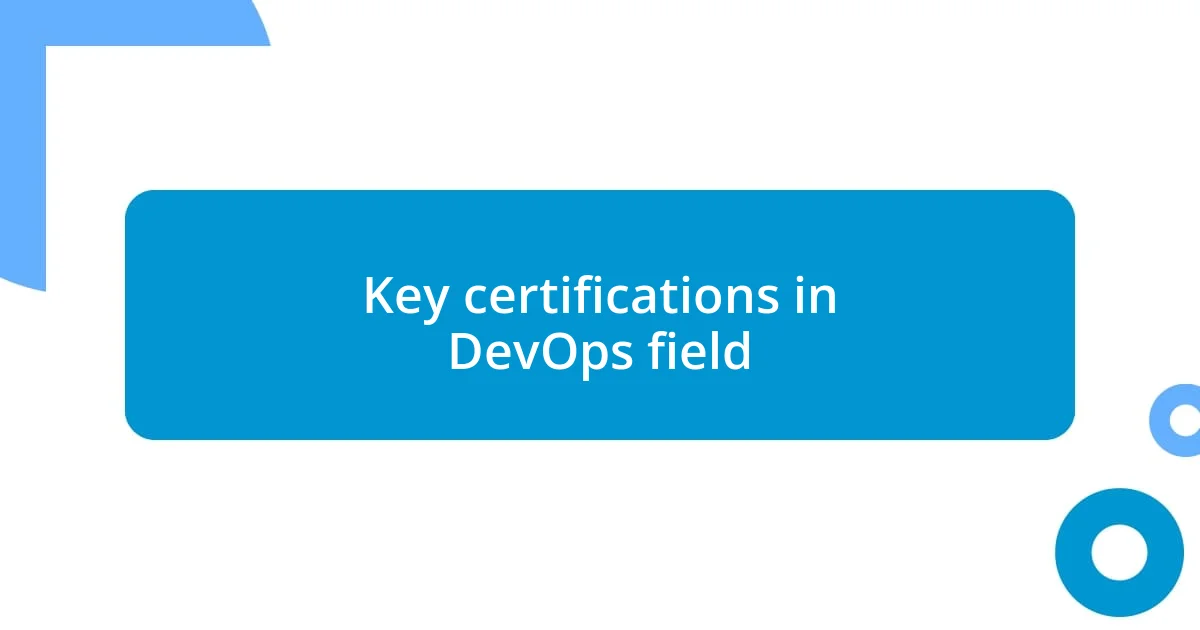
Key certifications in DevOps field
The choice of certifications in the DevOps field can significantly impact one’s career trajectory. When I started looking into my options, I wasn’t sure which would align best with my career goals. There’s a foundation certification focusing on the principles of DevOps, which I thought would give me a solid start. I also came across specialized ones like AWS Certified DevOps Engineer, which seemed like a great fit for someone eager to dive deeper into cloud services.
As I navigated through the options, I realized some certifications emphasize tools, while others focus on methodologies. Each path has its own benefits and can lead to different opportunities. For instance, obtaining the Certified Kubernetes Administrator certification opened up numerous discussions for me regarding container orchestration—a trendy topic in many tech circles. I found that this specialization helped me connect with experts and grow my knowledge in a niche that was rapidly gaining traction.
Ultimately, selecting the right certification often boils down to your personal career objectives and interests. While broad certifications like the DevOps Foundation offer a comprehensive overview, targeted ones can hone specific skill sets. I recall my excitement shifting gears when I found one that blended theoretical insights with practical applications, enhancing both my resume and my confidence in applying what I learned in real-world scenarios.
| Certification | Focus Area |
|---|---|
| DevOps Foundation | Principles and Practices |
| AWS Certified DevOps Engineer | Cloud Services |
| Certified Kubernetes Administrator | Container Orchestration |
| Microsoft Certified: DevOps Engineer Expert | Azure DevOps Solutions |
| Google Professional DevOps Engineer | Service Reliability |
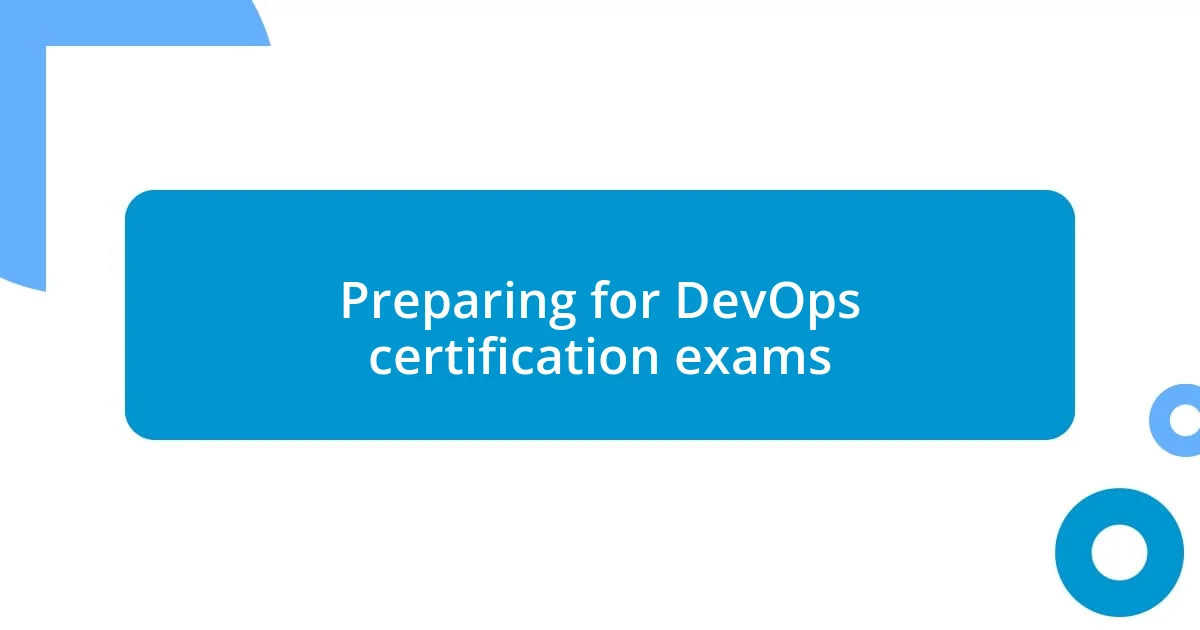
Preparing for DevOps certification exams
Preparing for DevOps certification exams is both an exciting and daunting journey. Reflecting on my own experience, I remember how essential it was to establish a structured study plan. Did I ever tell you about the time I tried to cram everything the night before? It was overwhelming! Breaking the material into manageable segments made it so much easier to absorb each concept. I found that setting small, attainable goals for each study session kept my motivation high and my stress levels low.
During my preparation, I discovered that practice exams were a game-changer. They not only tested my knowledge but also familiarized me with the exam format, which eased my anxiety. The thrill of seeing my scores improve over time was incredibly rewarding. It felt like lifting weights, where every lift builds strength—each completed practice test strengthened my confidence. Have you considered how practice tests could serve as a powerful tool in your study arsenal?
I also learned the value of community while I was preparing. Engaging with study groups or forums made the process feel less isolating. I remember discussing tricky topics with peers, which not only clarified my understanding but also fostered connections that turned into lasting friendships in the industry. Sharing our struggles and successes brought a sense of camaraderie that motivated me during the tough days. Have you thought about seeking out a community for support during your own prep journey? It can truly make all the difference.
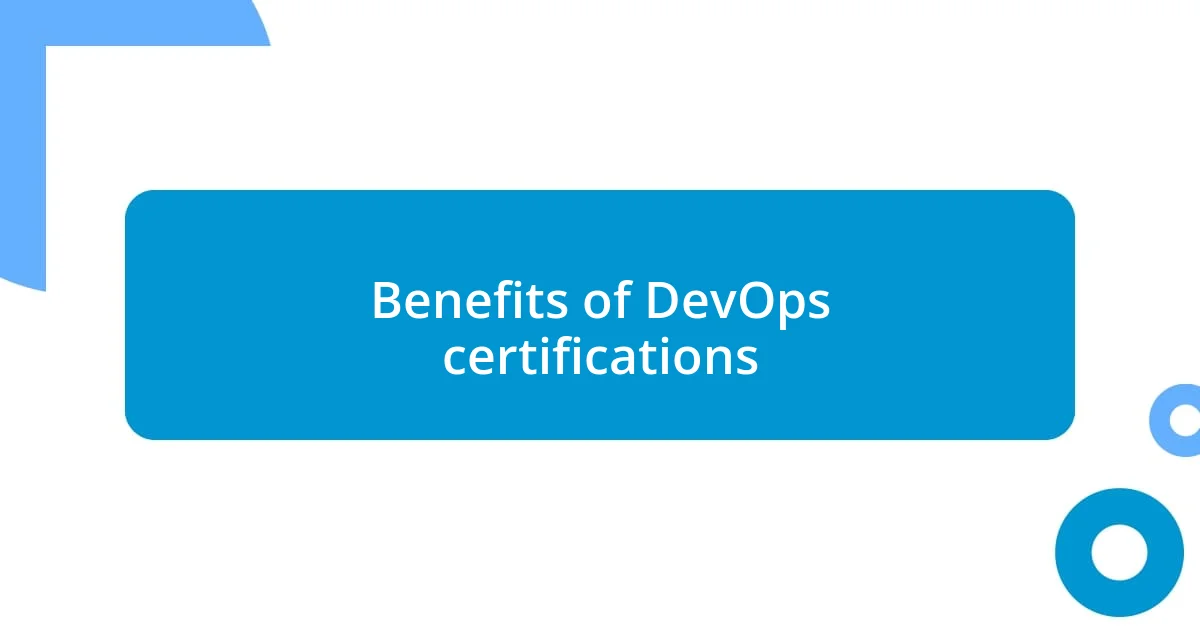
Benefits of DevOps certifications
The benefits of DevOps certifications are numerous and noteworthy. Personally, earning my DevOps certification not only boosted my technical skills but also significantly enhanced my job prospects. I remember vividly the moment I received my certification; it felt like being handed a key that unlocked new doors in my career, making me a more attractive candidate in a competitive job market.
What surprised me the most, though, was the confidence that came from my studies. I found that with each new concept I mastered, I could approach challenges at work with a fresh perspective. For instance, learning about continuous integration and deployment transformed my understanding of streamlined workflows. Hasn’t it ever happened to you where knowledge suddenly shifts your entire viewpoint?
Moreover, certifications provide credibility in discussions and networking opportunities. I cherish the moments when I could engage in meaningful conversations with industry peers, knowing I was equipped with validated expertise. I once attended a tech meetup, and when I shared my certification achievements, I instantly connected with professionals who resonated with similar experiences. It’s remarkable how a simple certification can serve as a common thread, fostering connections that might not have occurred otherwise.
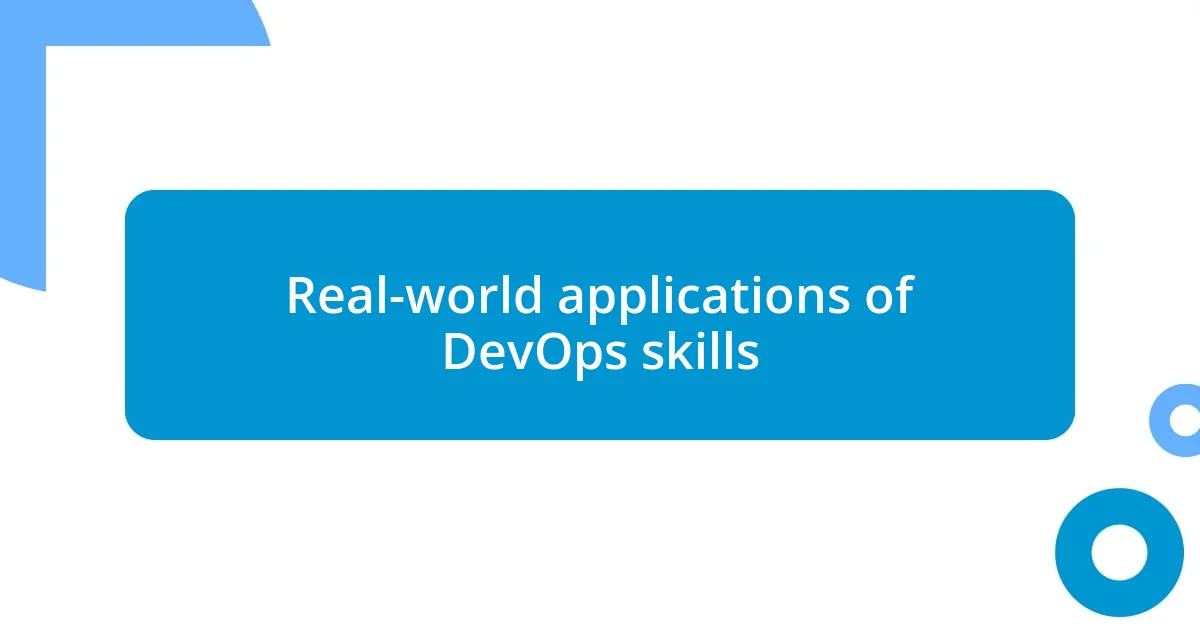
Real-world applications of DevOps skills
Many organizations today are embracing DevOps practices to enhance their software development lifecycle. In my experience, utilizing automation tools such as Jenkins or GitLab CI/CD significantly accelerated delivery times for projects I worked on. Have you ever felt the satisfaction of watching a code change go live in just minutes instead of days? It’s a game-changer!
One of the most tangible applications of DevOps skills I encountered was in the shift to a culture of collaboration. I distinctly recall a project where breaking down silos between developers and operations not only reduced response times but also fostered a sense of teamwork that was previously lacking. Has there been a time when communication issues slowed your project down? In this instance, the result was not just a smoother workflow but a collective pride in our achievements.
Additionally, understanding monitoring and logging tools like Prometheus or ELK Stack can dramatically improve system reliability. I once integrated a real-time monitoring solution that alerted us to issues before they escalated—what a relief that was! It transformed our approach to maintenance and taught me the value of being proactive rather than reactive. Can you imagine how much stress it eliminates when you can foresee and fix potential problems before they affect users?
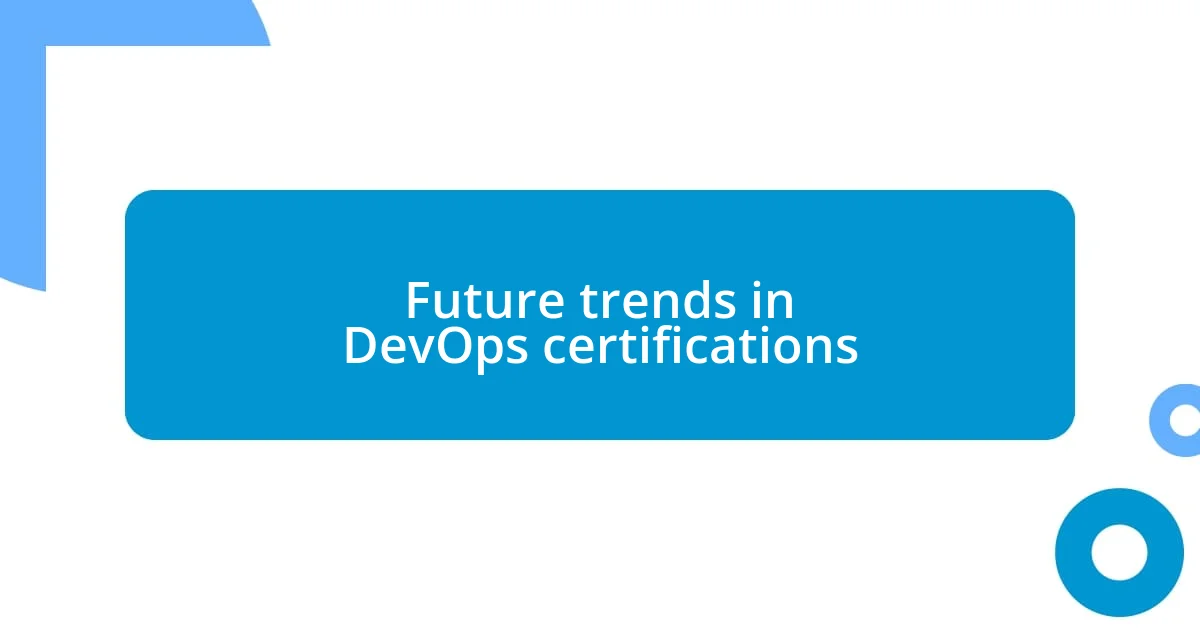
Future trends in DevOps certifications
As the landscape of technology continues to evolve, I see a growing trend towards specialized DevOps certifications. In my view, certifications will increasingly focus on niche areas, such as security in DevOps or cloud-native environments. Have you noticed how the demand for cybersecurity skills is skyrocketing? This trend reflects a deeper understanding that security must be a priority in every stage of the development lifecycle.
Moreover, I’ve found that the shift towards microservices architecture is reshaping the certification offerings. The need to manage and orchestrate numerous services means that certifications will soon require candidates to demonstrate expertise in containerization tools like Docker and Kubernetes. I vividly recall the first time I deployed an application using Docker; the feeling of empowerment and efficiency was unparalleled. Can you recall a moment when learning a new technology radically changed how you worked?
Then there’s the impact of continuous learning. I believe that micro-credentials and ongoing education will become essential as DevOps evolves. Take my experience: after completing my initial certification, I was eager to keep learning. Joining online courses and attending workshops not only kept me up-to-date but also ignited a passion for sharing knowledge. Is there anything more rewarding than guiding someone else through their learning journey? It’s clear to me that staying relevant in this field demands a commitment to lifelong learning.






